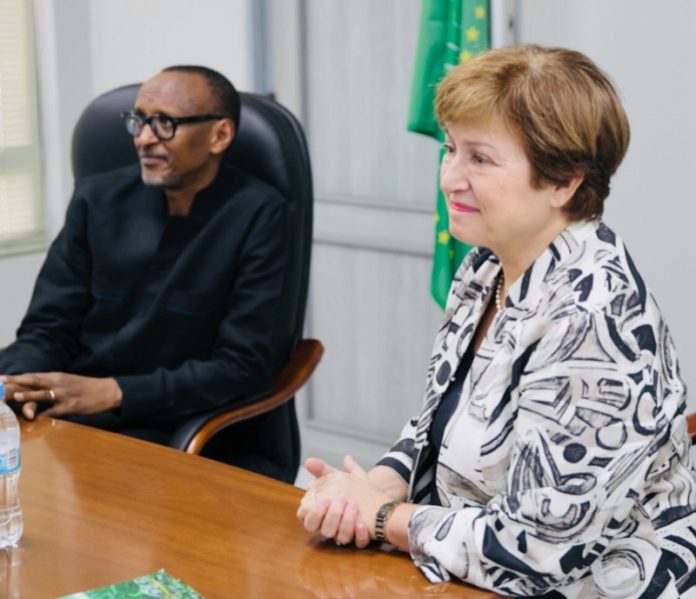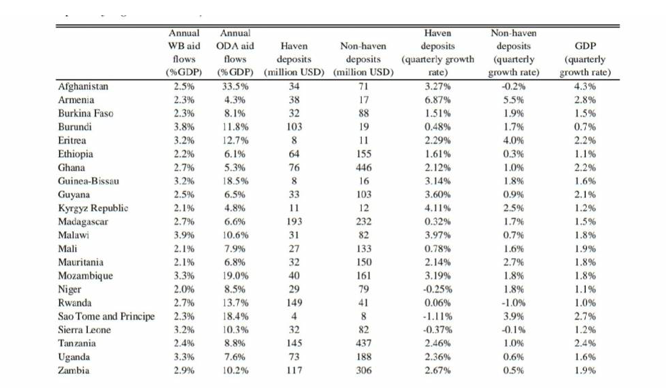
INTRODUCTION
Rwanda thanks to laudable lobbying and advertisement is reputed to rationally use the aid its granted and thus benefits from favors of the institutions of Breton woods i.e. the world bank and the international monetary fund. Unfortunately, as Congolese maxim says the lies fly through lift and reach the destination but truth also mounts by stairs and achieve the walk weeping all traces of the deception, there is finally found out that the big part of those aids are deviated on big fishes account in foreign banks.
1.Funds deviated and deposited in offshore havens.
Former World Bank chief economist and colleagues from two European universities have published a long-awaited research in which they show that global aid to poorest countries like Rwanda, is instead being retransferred to offshore havens.
The research was done by Penny Goldberg, a World Bank chief economist, who resigned two weeks ago from her job when the leaks about the research emerged. The other colleagues are — Jørgen Juel Andersen of BI Norwegian Business School and Niels Johannesen of the University of Copenhagen and CEBI. The final contributor to the research was the World Bank’s Bob Rijkers.
The research titled “Elite Capture of Foreign Aid: Evidence from Offshore Bank Accounts”, was done for the World Bank, but then the findings proved too embarrassing for publication. The researchers were reportedly not allowed to share its contents. Penny Goldberg decided to leave her job, and the whole document is now published on her website.
The Chronicles reviewed the 46-page document and it gives grim reading. Reviewing data of 22 countries including Rwanda, the team shows that aid granted by the World Bank is falling into the wrong hands.
“After aid to a country increased, money departs for offshore havens,” reads the research in part.
The other countries in the research are Tanzania, Zambia, Afghanistan, Armenia, Burkina Faso, Eritrea, Ethiopia, Ghana, Guinea-Bissau, Guyana, Kyrgyz-Republic, Madagascar, Malawi, Mali, Mauritania, Mozambique, Niger, Sao Tome and Principe, and Sierra Leone.
The research document is rather complicated. The research used quarterly information on aid disbursements from the World Bank, to these 22 most aid-dependent countries, in combination with Bank for International Settlements banking statistics, which cover the flows between the country receiving the aid and havens such as Switzerland, Luxembourg, the Cayman Islands and Singapore, where secrecy and asset protection are paramount.
For comparison, the research also looks at flows between the recipient country and Germany, France and Sweden — places not as vaunted for their banking secrecy. Scenarios that you would expect to lead to higher inflows and outflows, such as wars or financial crises, are excluded.
For the case of each country, the research shows how much money moved out from the state coffers, immediately it arrived from the World Bank.
For Rwanda’s case, the annual World Bank disbursement is 2.7% of GDP. For example, in 2018, Rwanda got double what it used to get in previous years, rising to $545m from the World Bank.
The researchers shows that in their investigation, $149m exited Rwanda and was deposited in offshore havens. During the same period, $41m left Rwanda for non-offshore havens. This means $190m left Rwanda in a very short period of time.
For offshore deposits of money from Rwanda, the researchers found a quarterly increase of 0.06% in deposits for offshore havens, but the deposits in non-offshore havens reduced by -1.0%.
In Tanzania, the money leaving the country’s coffers to be hidden away, is exorbitant. During the period that the researchers investigated, $145m left Tanzania for offshore accounts. However, a whopping $437m was deposited in non-offshore havens.

Here is compilation of how money is flowing out the sampled countries (courtesy document)
South Sudan and Kenya, both EAC members are not in the research. What is clear is that Rwandans prefer hiding most of their money in those deeply secret havens where no one will ask questions. While, Tanzanians are fine with stealing the World Bank cash and sending to places that do not tolerate spoils of theft from poor countries.
There was a problem that the researchers admit in the paper. For instance, it was impossible for them to tell who exactly in terms of names, is moving the funds out of the country, with the statistics used, only counting the total flows per quarter between countries.
While there have been different leaks over the years showing how money was flowing from poor countries to Switzerland, Luxembourg, the Cayman Islands and Singapore, it is the first time Rwanda has been highlighted. It is particularly shocking as the data comes from inside the World Bank, which has repeatedly given a clean bill of health for different aspects of Rwanda.
2.Close confidants to the Head of State cited in Panama Papers
They loot their countries, swim in a sea of wealth and stash funds away from their empoverished homelands, mostly in Western foreign lands, while their people are starving or dying from easily preventable diseases, and their killing squads are brutally murdering those who dare to speak up against corruption, embezzlement and tyranny.
“They” are tyrants and corrupt foreign leaders and their relatives and confidents. They come from all over the World. Africa counts many. After siphoning the economies of their countries, they use the loot to buy mansions, private jets, yachts, rare paintings and artworks, luxury apartments, jewelry, million dollar cars, and other expensive items in the West or hide the money through shell companies.
Some of them were cited in the Panama Papers (see our article: Panama Papers Revelations: US Department of Justice Investigating Corruption and Blood Money). Now, most have been covered in what is known as Paradise Papers (see here).
While activities of stashing money in fiscal paradises may not be illegal in several instances, some African dictators hide behind a legal framework with the main purpose of money laundering. Also, even if the process may be legal, it may mean “that we’re not investing as much as we should in schools, in making college more affordable, in putting people back to work rebuilding our roads, our bridges, our infrastructure, creating more opportunities for our children, ” as former US President Obama put it; it may be a matter of life or death in Africa.
For example, one case highlighted by the Paradise Papers is of two closest confidants of Rwandan President General Paul Kagame: Brig. Gen. Emmanuel Ndahiro and businessman Hatari Sekoko, who were also cited in the Panama Papers. According to Paradise Papers:
“Brig. Gen. Emmanuel Ndahiro is a confidant of Rwandan President Paul Kagame, having served as the president’s physician, security adviser and spokesman.He also served as military spokesman when Kagame was minister of defense from 1994-2000. Ndahiro led Rwanda’s National Intelligence and Security Services from 2004-2011. In 2015, Kagame promoted him to brigadier general”
The Paradise Papers show that Emmanuel Ndahiro became a director of British Virgin Islands company Debden Investments Limited in September 1998, the same year in which Ndahiro regularly appeared in international news as a spokesman of the Rwandan army. Debden reportedly owned a jet aircraft. At the time of his appointment, Ndahiro’s listed address was a building in a commercial section of a West London neighborhood. Hatari Sekoko, a former soldier with the Rwandan Patriotic Front and now a major business executive, was the company’s owner. The company was deactivated in 2010.”
After Panama Papers, Paradise Papers have brought into the open what some African leaders hide behind a smokescreen of public relations.
3.The president involvement
President Paul Kagame is named in the Panama Papers. The Panama Papers represent the latest leak of confidential documents. How much data has been leaked in the Panama Papers? A lot — the leak is said to be even larger than the US diplomatic cables released by WikiLeaks in 2010. The Washington, D.C.-based International Consortium of Investigative Journalism (ICIJ) that released the Panama Papers investigated 11.5 million documents and 2.6 terabytes of information.
We can say that a bombshell just dropped from the sky this Sunday, March 04, 2016 when the Panama Papers hit the news. Jaw-dropping “Panama Papers” show a global network of offshore companies helping the wealthy hide their assets.
So who are the secret accounts holders? There are all kinds of people, including a dozen current and former world leaders, businesspersons, criminals, celebrities as well as sports personalities.
According to the ICIJ, the data they examined span almost 40 years, from 1977 to the end of 2015. ICIJ says its investigations allows “a never-before-seen view inside the offshore world — providing a day-to-day, decade-by-decade look at how dark money flows through the global financial system, breeding crime and stripping national treasuries of tax revenues.
CONCLUSION
It’s unsurprising that many African officials and their families have been named in the Panama Papers. In Africa, as in many other parts of the world, there’s a long tradition of using offshore finances to hide money or to bypass local regulations (although offshore assets can also have legitimate and legal uses). But the Panama Papers are revealing just how widespread the practice has become. The leaked documents are causing discomfort for many of Africa’s more autocratic regimes. Some, like Rwanda, are trying to keep the revelations out of the media. In the Democratic Republic of the Congo, the government of President Joseph Kabila has warned of potential legal action against any media that publish the names of Congolese politicians who are cited in the Panama Paper. Specifically as far as Rwanda is concerned, what have we here? what will Mr. incorruptible Kagame do? In normal societies, something like this would cause a political crisis. This is what has just happened in Iceland. One of the more prominent names featured in the Panama Papers is that of Iceland’s Prime Minister Sigmundur David Gunnlaugsson. He is expected to call an election. Do not expect Kagame to utter even one word.
By The Rwandan Economist






























































